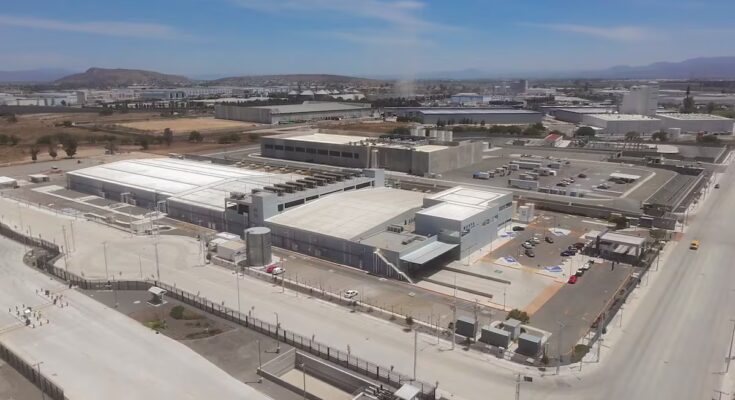A few kilometers from Querétaro airport, immense industrial warehouses are being built that will host, in the coming years, the data centers that large technology companies will need to support the cloud and artificial intelligence. The richness of the Querétaro plain in central Mexico reflects the attraction the Latin American country is gaining among transnational companies willing to invest in global technological growth. This frenetic development, however, is accompanied by a number of doubts about whether Mexico has the resources and manpower needed to support these data centers.
The biggest bet on the Mexican technology center was made by the American company CloudHQ. In September the company announced the construction of a data center consisting of six buildings and an electrical substation. The entire project will involve an investment of $4.8 billion and, according to the company’s plan, will be operational in the first half of 2027. “We would not invest this amount if there was a risk of investing in Mexico,” Keith Harney, the company’s director of operations, commented at the time. CloudHQ is joined, for now, by companies such as Microsoft, Amazon Web Services, KIO, Equinix and Ascenty, which have also developed facilities in the region or plan to do so.
It’s no secret that data centers require a significant amount of electricity to operate. Mexico has struggled in recent years, faced with the rise of NearShoring— in guaranteeing the production and distribution of electricity for the country’s industrial sector. The high demand for these new centers raises the question of whether the country and its state utility, the Federal Electricity Commission (CFE), will be able to provide the energy needed for this nascent industry. The Mexican Data Center Association estimates that over the next five years, Mexico will need five times more electricity capacity to supply these centers. Furthermore, it is underlined that by 2030 investments could reach 18 billion dollars and impact GDP growth by 5%. All this, if Mexico can solve the electricity production equation.
To support the constant energy consumption of data centers, this electricity must be produced with gas, explains Oscar Ocampo, director of Economic Development at the Mexican Institute of Competitiveness (IMCO). “For Querétaro, not only will the power generation capacity be needed, but its transmission and infrastructure to reduce power are still missing,” says the specialist, who estimates that the construction of combined cycle power plants is feasible, but warns that the electricity industry will have to take accelerated measures to achieve it. “We come from six years in which there were practically no investments in electricity,” he underlines.
Over the past seven years, Mexico’s energy policy has shifted toward “self-sufficiency,” tipping the scales in favor of the two state-owned energy companies: Petróleos Mexicanos (Pemex) and the Federal Electricity Commission (CFE). 54% of the country’s electricity must be generated by the state, through the CFE, which has begun to raise concerns among the private sector interested in the expansion of the technology industry and Washington. “The Government wants to change direction towards the digital economy, but we find ourselves facing the wall of reality which is energy insufficiency,” says Sofía Ramírez, director of the NGO Mexico, how are we doing? “The government is betting that there are power generation projects that were built on private initiative and that for some reason have been blocked,” he adds.
The vision that Mexico must engage in the new digital economy is also supported by the executive directors of the World Economic Forum (WEF), who in October visited Mexican President Claudia Sheinbaum to learn first-hand about the ambitions of her Mexico Plan. Then the president and the leaders underlined that the demographic bonus that the country still has is fundamental, as are their plans to improve the generation and distribution of electricity. After that meeting, Salesforce director Marc Benioff announced a billion-dollar investment to develop artificial intelligence in Mexico over the next five years. The American company will not open a data center, but this week it inaugurated its Global Delivery Center, a center to be developed software for companies from other regions: in Mexico City.
A global analysis by Salesforce on the future of the digital economy in artificial intelligence recognizes Mexico’s potential in the new industry. However, he also warns that the country “continues to grapple with fundamental issues such as connectivity, institutional capacity and workforce readiness.” “There is a significant gap in what the labor market demands of the existing workforce,” agrees Ramírez, from Mexico. How are we doing? Given the limited workforce skilled in technology, the state is already committed to education in that sector. This same week, the Sheinbaum administration launched the Public Training Center in Artificial Intelligence, a public school in southern Mexico City where students will study artificial intelligence, data analytics, cloud, Java and cybersecurity. The initial estimate is that 25,000 students graduate each year with potential jobs in the new industry.
The impact of Mexico’s move towards the digital economy will be reflected in the years to come, first through the industrial sector, with the construction of data centers, and then, in services, with the implementation of its technology. While the coin is spinning in the air, construction continues on Highway 100 in Querétaro of centers with swimming pools to store the water on which its cooling depends – one of the signs that environmental groups have denounced in light of the imminent arrival of technology companies – and states such as Nuevo León, Guanajuato and the State of Mexico are considering the possibility of joining Querétaro in the effort. “It is a bet on the future that ensures that Mexico is not excluded from the digital revolution that will define the coming decades,” Economy Minister Marcelo Ebrard said of investors’ approach to the country.



